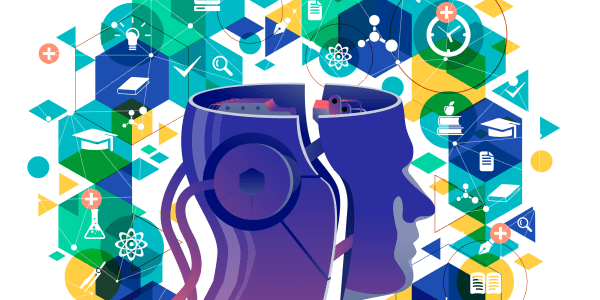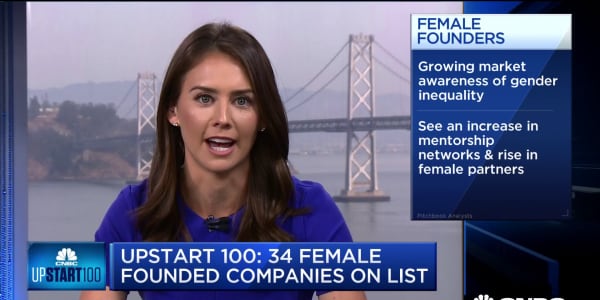P.T. Barnum has nothing on Elon Musk, whose every word and tweet are met with excitement by millions around the world. In fact, when CNBC asked the founders and CEOs of young start-ups that made the recent CNBC Upstart 25 list who they would want as a guest speaker at their company, nine of the 25 named the Tesla Motors, SpaceX and PayPal founder.
"When he sees a problem or opportunity to do something better, he builds a company to solve it," said Jason Palmer, co-founder and COO of on-the-go charging company MobileQubes. Indeed, Musk announced another new company this week, called Neuralink, which will work on neural lace, a technology he's hoping will literally meld man and machine, attaching artificial intelligence to the human brain's cortex (he'll figure out the details later). Musk was also busy raising the bar in rocketry this week: For the first time in history SpaceX was able to re-use a rocket in a successful launch.
Musk is even an inspiration in the low-tech industries on our Upstart 25 list. Galit Laibow is CEO and co-founder of Foodstirs, the on-demand healthy baking start-up that lists actress Sarah Michelle Gellar among its founders. Laibow told CNBC she would want Musk first because he "is all about vision, challenging status quo and reinventing the norm — much as we're about reinventing the baking industry."
The founders of DroneDeploy noted, "We're three South African co-founders trying to bring a completely new technology to the world. He's a South African-born entrepreneur whose done it three times."
But founders and CEOs of Upstart 25 companies also revealed a few surprises: Some great visionaries of our time and some from long ago.
Gloria Steinem: Speaking up for girls
Although Silicon Valley hasn't earned high marks for its treatment of gender, many more start-ups are being founded by women, including 10 on the Upstart 25 list.
The founders of feminine hygiene products company Lola and investing firm Ellevest — started by one of Wall Street's most powerful women (Sallie Krawcheck) — named Gloria Steinem as the speaker they would bring in before anyone else. These were also the only founders who added no explanatory language supporting their selection — the name alone was enough. But the feminist icon was not the most popular female choice. Michelle Obama, former First Lady, was the most in-demand speaker after Musk. "We know she's on a beach somewhere, but we'd love hearing from Michelle Obama. She brings many lessons on rallying people to causes that are important," said Ursula Mead, CEO and founder of InHerSight, a start-up focused on helping women find the best career fits.
For Grokker, an on-demand fitness start-up, this is no hypothetical exercise. Its founder and CEO, Lorna Borenstein, has been hosting a series of webinars featuring business leaders on Silicon Valley secrets and culture, for which she has had "high-powered girlfriends who hail from Pinterest, Google, Yahoo!, Lifelock, Kleiner Perkins, etc."
Ed Feitzinger: The guy behind Amazon's every move
It's Ed Feitzinger, vice president of global logistics at Amazon, not CEO and founder Jeff Bezos, who actually helps move packages with maximum efficiency. And that's why the co-founder of Kenya-based agriculture start-up Markit Opportunity would invite Feitzinger before Bezos. "Our offer to smallholder farmers is creating supply chains that are more efficient and effective at increasing transparency, and having his expertise and experience with supply-chain logistics, combined with the ability to lead, would be very insightful for the team," said Zeluis Teixeira, co-founder.
Amazon hired Feitzinger, a former CEO of UTi Worldwide, one of the largest supply-chain management companies, last September. While Amazon says publicly it won't compete with FedEx or UPS, Amazon has now built facilities within 20 miles of 44 percent of the U.S. population, according to PiperJaffray. And at the same time, it's becoming more global. This week Amazon announced it had acquired the Middle East's largest online retailer, Souq, for $800 million.
Shipping economics have never been more important to Amazon. A big reason for its current vicious price war with consumer brands and Wal-Mart is difficulty moving lots of packages at a profit.
Ajit Pai: The new gatekeeper of the internet
Regulators may seem like the boring people of technology, seeking to limit its reach rather than lead innovation, but this week new Federal Communications Commission chair Ajit Pai demonstrated a little bit of his power to influence, if not inspire, every single move made online.
Congress voted to reverse an Obama-era rule that limited the ability of the telecommunications companies that provide broadband access to sell private-user data without consent. It is a decision that Pai supports (he voted against the Obama-era rule when he was in the minority among FCC members). Pai is also expected to revisit net neutrality rules enacted during the Obama era, which was designed to prohibit broadband providers from playing favorites among apps and services. Pai attracted the attention of cloud software services start-up Midfin Systems founders, who said, "We would like to bring Ajit Pai, the new FCC chair, so that we can help inform the national and global agenda on the future of internet."
The start-up's co-founders share something in common with Pai: All three are Indian-Americans.
George Orwell: A voice from the past with a message about the future
Since Donald J. Trump's election, copies of George Orwell's dystopian classic "1984" have returned to the best-seller list. So it should not come as too big a surprise that start-ups don't just want to read the book but have George Orwell as their dream guest speaker. It also makes sense that it's cybersecurity founders who are infatuated with the novelist who created the "Big Brother" surveillance state.
Pavel Gurvich, CEO of GuardiCore, one of the growing number of Israeli-founded cybersecurity start-ups, said of Orwell, "I think he had a very far-looking vision of how technology and society can evolve. '1984' is a warning of a future world where the machine exerts complete control over social life. ... We believe that technology should serve mankind, not control it. ... It would also be incredibly interesting to hear Orwell's vision now — if he knew what we know today — about how technology and society have evolved since his publishing of '1984' in 1949."
Norbert Weiner: A child prodigy who was way ahead on machine intelligence
We're gonna guess this is a name most people don't know today, even if once upon a time, Norbert Weiner was a cultural sensation. This child prodigy was all over the popular press between the 1900s and 1910s for graduating high school and attending Tufts University at 11, then receiving his Ph.D. from Harvard at 18. Weiner spent decades as an MIT professor and wrote a book that widely popularized the idea of machine intelligence, "Cybernetics," in 1948 (one year before Orwell's classic). The book's title was chosen by Weiner himself, and terms such as cyberspace and cyborg stem from it, summing up just how far it has reached,
The actual theory of cybernetics — that machine intelligence could recreate the brain— were way ahead of actual science. But as today's research into artificial intelligence continues — and as Musk looks for a way into the human brain directly — start-up founders do look back to Weiner as a touchstone. Interestingly, it's the founders of a start-up that melds man and machine in a physical relationship that cited Weiner. Assaf Biderman, CEO of Superpedestrian, which is aiming to reinvent cycling through a robotic approach — and from Weiner's home turf at MIT — noted that Weiner's "theories of human machine interaction in the 1960s pioneered a transformative new field of cybernetics."
Pedro Domingos: Musk and Hawking aren't the only A.I. oracles
The rise of machine intelligence has led to dire predictions about an apocalypse from noted thinkers including Musk and physicist Stephen Hawking. But the founders of Scalable Capital, while citing Hawking, had a less well-known figure in mind as a guest speaker on A.I.: Pedro Domingos, a professor at the University of Washington.
Scalable Capital is one of the so-called robo-advisors betting that computers can do a better job of investing than human financial advisors and stock pickers. Musk has cited the book "Superintelligence" by Oxford University philosopher Nick Bostrom as the most important work on the risks posed by A.I., but Scalable Capital's founders said Domingos "wrote one of the best books about A.I." His book, "The Master Algorithm," has other fans. In fact, you don't need to choose between Bostrom and Domingos: Bill Gates recently recommended reading both. Melinda Gates said at last year's Code Conference, "I can always tell what's on his mind by what's in his bag of books. And there have been a lot of A.I. books."
Sean Parker: But not because of Facebook or Napster
Sean Parker is known for many things, from his early days shaking up the music industry and mentoring a young Mark Zuckerberg to currently being among the world's billionaires. But less known is Parker's devotion to allergy and asthma research. That did not escape the notice of the founders of Nima, a start-up also born out of MIT that has created a personal food allergen detector. Nima's co-founder and CEO Shireen Yates said they would bring Sean Parker in to speak to Nima "because he is an innovative thinker with a long history in technology who also knows the food allergen space. He is taking great strides to improve research, care and increase awareness around autoimmune diseases and food allergens."
In addition to founding Napster and once serving as Facebook president, Parker founded the Sean N. Parker Center for Allergy and Asthma Research at Stanford University. Parker pledged $24 million to the effort in 2014, one of the largest private gifts to allergy research ever made. Doctor-diagnosed food allergies affect 1 in 12 American children under the age of 21 and 1 in 50 adults, according to the Center. Approximately 25 percent of those with a food allergy will have a near-fatal anaphylactic reaction at some point in their lives.
Parker knows: He suffers from a life-threatening nut allergy. He has also made large donations to cancer research.






